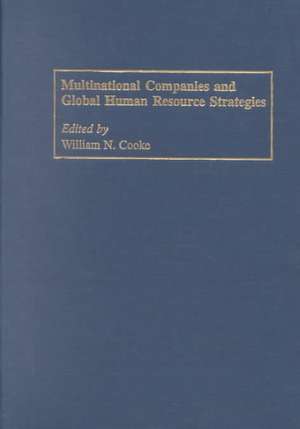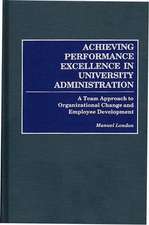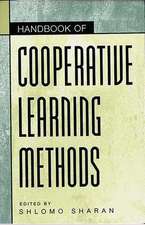Multinational Companies and Global Human Resource Strategies
Autor William N. Cookeen Limba Engleză Hardback – 27 feb 2003 – vârsta până la 17 ani
Preț: 443.15 lei
Preț vechi: 607.25 lei
-27% Nou
Puncte Express: 665
Preț estimativ în valută:
84.79€ • 88.54$ • 70.02£
84.79€ • 88.54$ • 70.02£
Carte tipărită la comandă
Livrare economică 15-29 aprilie
Preluare comenzi: 021 569.72.76
Specificații
ISBN-13: 9781567205831
ISBN-10: 1567205836
Pagini: 440
Ilustrații: Illustrations
Dimensiuni: 156 x 235 x 29 mm
Greutate: 0.81 kg
Editura: Bloomsbury Publishing
Colecția Praeger
Locul publicării:New York, United States
ISBN-10: 1567205836
Pagini: 440
Ilustrații: Illustrations
Dimensiuni: 156 x 235 x 29 mm
Greutate: 0.81 kg
Editura: Bloomsbury Publishing
Colecția Praeger
Locul publicării:New York, United States
Notă biografică
WILLIAM N. COOKE is Director of the Douglas A. Fraser Center for Workplace Issues, and Senior Research Professor in the College of Urban, Labor, and Metropolitan Affairs, Wayne State University. He is also the founder and faculty director of the Strategic Collective Bargaining executive education program at the University of Michigan's School of Business.
Cuprins
Global Human Resource Strategies: A Framework and Overview by William CookeForeign Direct Investment Strategies and Industrial Relations SystemsForeign Direct Investment and Its Employment Opportunities in Perspective: Meeting the Great Expectations of Developing Countries? by Gabriele KöhlerMNCs and Global Commodity Chains: Implications for Labor Strategies by Jennifer Bair and Harvie RamsayThe Influence of Industrial Relations System Factors on Foreign Direct Investment by William CookeThe Effect of Different Industrial Relations Systems in the U.S. and the European Union on Foreign Direct Investment Flows by Morris Kleiner and Hwikwon HamMultinational Company Human Resource Management and Labor Relations StrategiesA Process Model of Strategic HRM/LR Change in MNCs: The Case of AT&T and NCR in the U.K. by Graeme Martin, Phil Beaumont, and Judy PateTransferring the Learning Factory to America? The Japanese Television Assembly Transplants by Martin Kenney and Shoko TanakaConvergence or Divergence of Contingent Employment Practices?: Evidence of the Role of MNCs in Europe by Chris Brewster and Olga TregaskisMNCs as Diffusers of Best Practices in HRM/LR in Developing Countries by Sarosh Kuruvilla, Stephen Frenkel, and David PeetzTransnational Union StrategiesDual Sourcing at Ford in the U.S. and Mexico: Implications for Labor Relations and Union Strategies by Steve BabsonLocal Union Responses to Continental Standardization of Production and Work in GM's North American Truck Assembly Plants by Christopher HuxleyOut of the Ashes: The Steelworkers' Global Campaign at Bridgestone/Firestone by Tom Juravich and Kate BronfenbrennerStrategic International Laborism: MNCs and Labor in the Graphical Sector by John Gennard and Harvie RamsayTransnational Workplace RegulationSailing Beyond the Reach of Workplace Regulations: Worker Exploitation by MNCs on the High Seas by Clifford B. DonnCarrot or Stick? How MNCs Have Reacted to the European Works Council Directive by Trevor Bain and Kim HesterEarly Days: Belgian and U.K. Experiences of European Works Councils by Thérèse Beaupain, Steve Jefferys, and Rachel AnnandRegulating Employee Interest Representation: The Case of McDonald's in the European Union by Tony Royle and Brian TowersNAFTA's Labor Side Agreement: Withering as an Effective Labor Law Enforcement and MNC Compliance Strategy? by Mario F. Bognanno and Jiangfeng LuSummary and ConclusionThe Role of Power and Implications for Transnational Workplace Outcomes by William CookeIndex









